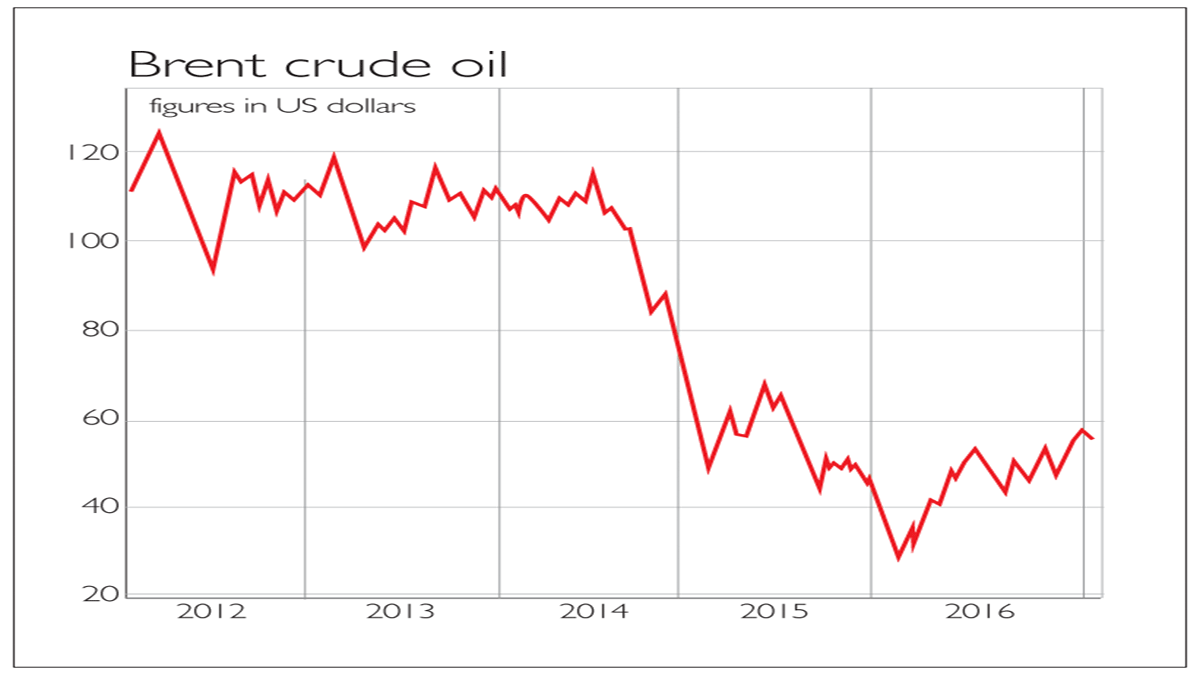Reasons to be bullish on oil
The quiet recovery in the oil price is a trend that hasn’t been getting as much attention as it should, but it may offer a trading opportunity, says Matthew Partridge.

Get the latest financial news, insights and expert analysis from our award-winning MoneyWeek team, to help you understand what really matters when it comes to your finances.
You are now subscribed
Your newsletter sign-up was successful
Want to add more newsletters?

Twice daily
MoneyWeek
Get the latest financial news, insights and expert analysis from our award-winning MoneyWeek team, to help you understand what really matters when it comes to your finances.

Four times a week
Look After My Bills
Sign up to our free money-saving newsletter, filled with the latest news and expert advice to help you find the best tips and deals for managing your bills. Start saving today!

The quiet recovery in the oil price is a trend that hasn't been getting as much attention as it should, but it may offer a trading opportunity. Over a period of 18 months, from the summer of 2014 to the start of 2016, the price of Brent crude fell by more than two-thirds from $100/barrel to a low of $35 in January of last year. Since then it has staged a rebound. This hasn't always been smooth: it fell back in both the summer and then again in the late autumn. Nonetheless, there is a clear upward trend, and it now stands at around $55/bbl.
There are three reasons why I expect this will continue in the near future. One cause of the dramatic collapse in oil prices was the decision of Saudi Arabia essentially to abandon the quotas set by Opec, the oil producers' cartel, and keep pumping crude.
This was partly motivated by a desire to make shale oil production in the US uneconomic, but was primarily designed to hit Russia and Iran, two of its main rivals in the battle for control of Syria. But the use of the oil price as an economic weapon proved to be too expensive for Saudi Arabia, with the result that at the end of the year it agreed to cut production. This agreement seems to be holding.
MoneyWeek
Subscribe to MoneyWeek today and get your first six magazine issues absolutely FREE

Sign up to Money Morning
Don't miss the latest investment and personal finances news, market analysis, plus money-saving tips with our free twice-daily newsletter
Don't miss the latest investment and personal finances news, market analysis, plus money-saving tips with our free twice-daily newsletter
At the same time the shale industry is still reeling from the drop in prices. While the numbers of rigs operating onshore in America has increased modestly from the 400 or so at work last summer, the rig count is still down around a quarter from where it was a year ago. It is also down 60% from the peak of around 2,000 three years ago. Lastly, while the oil majors are in a better financial position than they were at the start of 2016, they continue to cut exploration budgets to the bone, which again should limit global oil supply growth.
A further factor that might push up the price of crude oil is a fall in the value of the dollar. President-elect Donald Trump's plans for cutting taxes and increasing defence spending could send the dollar rally into reverse. Indeed, he recently stated that he felt that the dollar was too high and wanted to see it fall. Since crude oil is quoted in dollar terms, any fall in the value of the dollar could see the stated price rise even if there isn't any change in the underlying supply/demand balance.
Overall, this is a bullish set of drivers for crude. So for my inaugural trading idea in this new column, I'd suggest buying Brent crude, which trades at $55.43. I'd set a stop-loss at $48.50, the trend line that you'd get if you drew a line from the low in January 2016, and then connected it to the lowest price last November (see chart), and I'd take profits if the price hits $65. At £1 per $0.10, the minimum bet you can place with IG Index, this would mean a hypothetical downside of £693, and potential upside of £957.
Understanding stop-losses
One of the keys to trading and risk management is knowing when to take your losses and profits. The simplest method for doing this is to use stop-losses and limits. Stop-losses are an order to sell a share if it falls below a certain level (or rises above if you are betting against it). Limits are the level at which you want take profits. If you bought a share in Acme Widgets at 100p, with a stop-loss of 80p and a limit of 150p, you would sell if it fell to 80p or if it rose to 150p.
There are two special types of stop-losses. Guaranteed stop-losses protect you against the market "gapping": suddenly changing in price by a large amount without trading at an intermediate point. If Acme's shares suddenly gapped to 75p because of a profit warning, your position might be closed at 75p with a standard stop-loss, but would close at 80p if you used a guaranteed stop-loss. Spread-betting firms usually charge more for these, in the form of a higher spread (the difference between the bid price and the ask price) when you place your trade, but the added certainty can be valuable, especially for new traders.
Trailing stop-losses adjust in value as the price changes in your favour. Let's assume you set a trailing stop loss at 80p and Acme Widgets moves up to 125p. Your stop-loss would follow the price up and would be reset to 105p. If Acme then fell back, the stop-loss would remain at 105p and would be triggered if Acme dropped back below that price. Trailing stop-losses can help lock in profits in volatile markets, but they may also increase the risk of you being stopped out of a trade that would otherwise ultimately be profitable, especially if you are using tight stops.
Will firms flee the FCA's clampdown?
In December, the Financial Conduct Authority (FCA), the UK's financial services regulator, announced plans to clamp down on contracts for difference and similar products, including spread betting. The new rules would include plans to ban cash promotions and other incentives to attract new customers or encourage them to trade more frequently, but more significantly in terms of the impact on trading strategies they would strictly limit the amount of leverage that firms could offer their clients, especially for traders who didn't make frequent trades.
Other proposed regulations include a requirement to close out trades set by inexperienced traders once unrealised losses in their accounts reached a certain level (though these would not be guaranteed stop-losses see below meaning that clients could still lose larger amounts during periods of market volatility). The FCA even discussed bringing binary products under its regulatory umbrella. Currently these products are treated as a gambling product and run by the Gambling Commission.
The response has been a collapse in the prices of the major listed spread-betting companies, such as IG, CMC Markets and Plus500, which continue to trade at well below their previous levels. Many of these firms are reportedly now considering whether they should shift their base to other countries with less stringent regulations. Both CityAm and CNBC have reported that CMC Markets was considering moving to Germany, though CMC reportedly denied that it was planning to do this. While Germany has also announced new rules, these would only apply to betters who had a negative balance (ie, owed more than the value of their capital) and would still permit unlimited leverage. Meanwhile, the Daily Mail reports that FxPro has cancelled a planned stockmarket listing.
Get the latest financial news, insights and expert analysis from our award-winning MoneyWeek team, to help you understand what really matters when it comes to your finances.

-
 Could Chinese investments race ahead in the Year of the Horse?
Could Chinese investments race ahead in the Year of the Horse?As the Year of the Horse begins, we highlight the trends and sectors that could make great Chinese investments for the coming Lunar year
-
 Can mining stocks deliver golden gains?
Can mining stocks deliver golden gains?With gold and silver prices having outperformed the stock markets last year, mining stocks can be an effective, if volatile, means of gaining exposure
